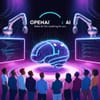OpenAI is on a mission to create AI agents that can "do anything for you," revolutionizing how we interact with technology. These agents aim to handle complex tasks with human-like proficiency, making them a potential game-changer in various industries. In 2023, OpenAI achieved a significant breakthrough by combining large language models, reinforcement learning, and test-time computation. This enabled AI models to plan and verify steps before providing answers, dramatically improving performance on unfamiliar math questions.
OpenAI's focus on developing AI reasoning models has led to significant advancements. Their model, o1, can perform tasks on a computer like a human would, and has even won a gold medal at the International Math Olympiad. The "chain-of-thought" approach allows AI models to reason and solve complex problems, improving AI performance on math questions and being explored for other applications.
However, AI agents struggle with complex, subjective tasks such as online shopping or finding specific parking spots. These tasks require nuanced understanding and adaptability that current models lack. OpenAI aims to build general-purpose agents that can intuitively understand user intent without needing specific settings, enabling AI systems to autonomously navigate the internet and complete tasks.
The company is leveraging reinforcement learning techniques to teach AI models skills that aren't easily verified. This approach has shown promise in developing more advanced AI models. If successful, OpenAI's agents could profoundly impact every digital interaction, making technology more intuitive and user-friendly. As a leader in the field, OpenAI is competing with other top AI labs like Google and Anthropic, prioritizing breakthroughs like o1.


